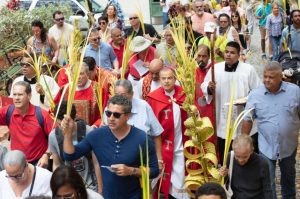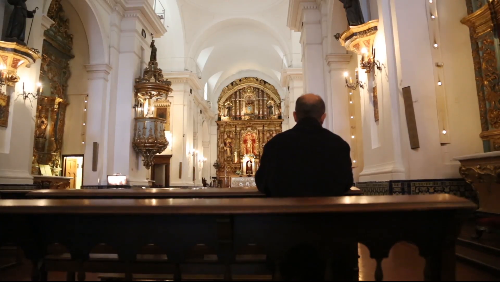
An excerpt from a pastoral letter on Christian Stewardship by the Most Reverend Roberto Gonzalez Nieves, Archbishop of San Juan, Puerto Rico
Introduction
“The Lord gave and the Lord has taken away; blessed be the name of the Lord!” [Job 1:21].
The story of the “widow’s mite” is about the offering of the poor widow in the Temple of Jerusalem whom our Lord Jesus Christ praised an offered as a model of stewardship to his disciples. The widow’s gift in the Temple came out of the Bible practice of tithing. The entire concept of stewardship is rooted in the same theology. God has given us life and everything we have. We are to use God’s gifts to us in a spirit of worship and praise, giving back to God in gratitude. This is the practice of stewardship.
The spirituality of stewardship
The Spirituality of stewardship asks us to recognize the greatness of God. God who created us with a Father’s love. God who redeemed us with the sacrifice of the Son. God who makes us holy by the sending of His Spirit. We should not grasp things selfishly to ourselves. God’s gifts are to be used to glorify Him and to share them with our fellow human beings. The command in Genesis to subdue the earth has been newly translated as “to cultivate and care for it” [Gen. 2.15]. The command of God to Adam to subdue the earth never meant to destroy it.
The fundamental principle of the spirituality of stewardship is to firmly believe that God is the Creator of all. God gives His gifts of life to His creatures. He gives the human person, the rational creature, the duty to return thanks and praise to Him. “Let us give thanks to the Lord our God” “It is right to give Him thanks and praise.” ” Dignum et justum est.” This is the daily song of the Church in the Preface of every Mass.
Who is a Christian steward?
Who then is a steward? Who practices stewardship in the biblical sense? Stewardship: A Disciple’s Response, the pastoral letter of the United States Conference of Catholic Bishops, gives a comprehensive definition.
“Who is a Christian steward?”
“One who receives God’s gifts gratefully, cherishes them and tends them in a responsible manner, shares them in justice and love with all, and returns them with increase to the Lord.”
This definition,” rooted in biblical and church tradition, corresponds with Almighty God’s decision to entrust to humanity the universe God had created [Genesis 1:26-31] and with Jesus Christ’s famous parable of the talents [Matthew 25: 14-36]”.
“For disciples of Christ–everyone who responded to Jesus’ invitation, ‘Come follow me’, Christian stewardship holds every individual accountable to God for personal care of the universe. At the time of judgment, God will have the right to ask: ‘What did you do with my world?'”
“Christian stewardship, therefore applies to everything–all personal talents, abilities, and wealth; the local, national and worldwide environment; all human and natural resources wherever they are; the economic order, governmental affairs; and even outer space. This stewardship does not tolerate indifference to anything important in God’s world.”
To be stewards of the sacredness and dignity of human life
From what the bishops’ pastoral letter declares, we are reminded to be stewards of the sacredness and dignity of human life from the very first moment of conception until natural death, to be stewards of the unborn, the poor and homeless, the disenfranchised and even nature.
The Church wants to see God’s sovereignty recognized in our duties to both God and humankind. We can see the social teaching of the Church, the pro-life teaching of the Church, and the very way of life taught by the Church outlined in the definition of the Christian steward as the one who keeps the two great commandments: to love God above all things and to love the neighbor as one’s self. To the rich young man, Jesus replied, “If you seek perfection, go and sell your possessions and give to the poor. Then you will have treasure in heaven” [Matt 19:21].
The invitation follows, “Come follow me!” The perfect disciple is one who has given all to the Lord in the person of His poor. We might see Saint Teresa of Calcutta as an example of this perfect disciple.
Stewardship and solidarity
Stewardship was a topic in my Intervention at the Synod for America, December 1997, in the Vatican. The Holy Father asked the bishops of America to propose means of advancing “The Encounter with the Living Jesus Christ: The Way to Conversion, Communion and Solidarity in America ” the synodal theme chosen by the Holy Father.
I opened my words to the Synod as follows: “My own intervention is to offer an insight into how we might go from words to action and concretize the implications of solidarity in the new evangelization through the practice of good stewardship of the time, talents and treasure God has given to us in an outstanding manner.”
Elements of Christian stewardship
I proposed that “if we, as followers of Jesus Christ, are to strive to close the socioeconomic gap in our American Hemisphere and to express in a spirit of communio the ways in which we can be of pastoral assistance to one another, then we must promote the concept of good stewardship and continued sharing of time, talent and treasure within and among the churches of America.”
Let me close here with a brief outline of To Be a Christian Steward from the US Bishops’ Pastoral Letter on Stewardship.
Disciples as stewards
— mature disciples make a conscious decision to follow Jesus, no matter what the cost.
— Christian disciples experience conversion.
— Christian stewards respond in a particular way to the call to be a disciple.
— Stewardship involves the power to shape and mold our understanding of our lives and the way in which we live.
Stewards of creation
— respect from human life from conception to natural death
— development of the world through noble human effort
— Have a preferential solidarity with the poor
— Have a joyful appreciation for the God given beauty and wonder of nature
— protection and preservation of the environment
Stewards of vocation
— to answer the call God gives us as clergy, religious, laity, adult or child
— to grow in consciousness of the implications of our Baptism
— to live in the Spirit
— to be persons of prayer
— to live in Christ Jesus
Stewards of the church
— to cooperate with God in our own redemption and in the redemption of others
Obstacles to Stewardship
— a dominate secular culture
— selfishness and greed
— our sinfulness
A steward’s way
— “All things work together for the good for those who have been called according to his decree” [Romans 8:28].
— After Jesus, look to Mary – the handmaid of the Lord, a life of total fidelity and service.
— The Spirit shows the way. Stewardship is an integral part of that journey.
Conclusion
To go back to our beginning topic, The Spirituality of Stewardship: Sharing God’s Gifts, the Christian steward sees all as coming from God, his or her loving Father. He or she returns all he or she has to God in loving praise and service by keeping God’s laws which enjoin upon him or her the love of God and neighbor.
The vision of everything coming from the hand of a loving Father is particularly relevant today. Saint John Paul II maintained that, “The whole of Christian life is like a great pilgrimage to the house of the Father, whose unconditional love for every human creature, and in particular for the ‘prodigal son’ [cf. Luke 15:1-32], we discover anew each day. This pilgrimage takes place in the heart of each person, extends to the believing community and then reaches to the whole of humanity” [Pope John Paul II Tertio Millennio Adveniente #49].
“The Lord gave and the Lord has taken away; blessed be the name of the Lord!” [Job 1:21].


